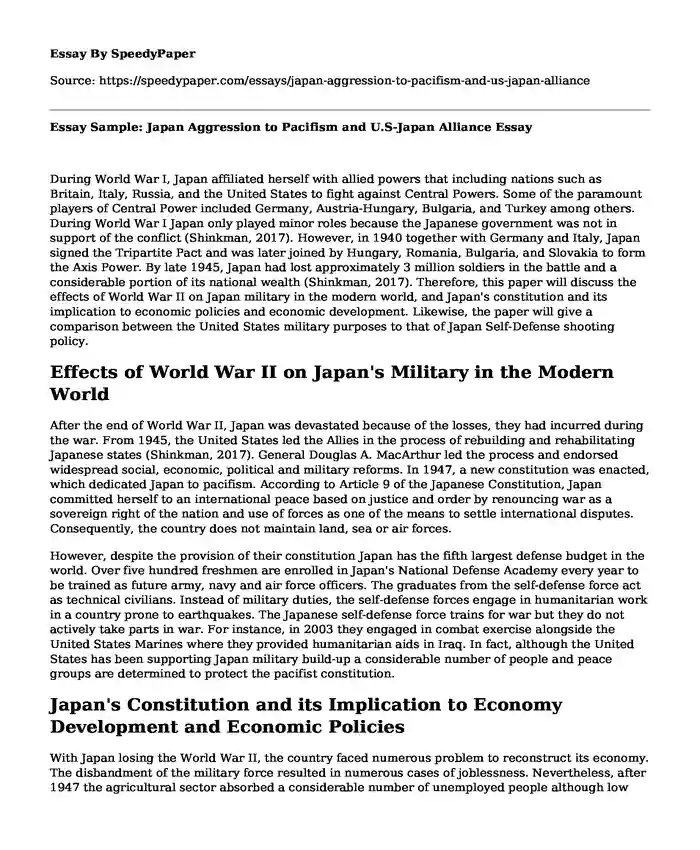
| Type of paper: | Essay |
| Categories: | World War 2 Economics |
| Pages: | 4 |
| Wordcount: | 845 words |
During World War I, Japan affiliated herself with allied powers that including nations such as Britain, Italy, Russia, and the United States to fight against Central Powers. Some of the paramount players of Central Power included Germany, Austria-Hungary, Bulgaria, and Turkey among others. During World War I Japan only played minor roles because the Japanese government was not in support of the conflict (Shinkman, 2017). However, in 1940 together with Germany and Italy, Japan signed the Tripartite Pact and was later joined by Hungary, Romania, Bulgaria, and Slovakia to form the Axis Power. By late 1945, Japan had lost approximately 3 million soldiers in the battle and a considerable portion of its national wealth (Shinkman, 2017). Therefore, this paper will discuss the effects of World War II on Japan military in the modern world, and Japan's constitution and its implication to economic policies and economic development. Likewise, the paper will give a comparison between the United States military purposes to that of Japan Self-Defense shooting policy.
Effects of World War II on Japan's Military in the Modern World
After the end of World War II, Japan was devastated because of the losses, they had incurred during the war. From 1945, the United States led the Allies in the process of rebuilding and rehabilitating Japanese states (Shinkman, 2017). General Douglas A. MacArthur led the process and endorsed widespread social, economic, political and military reforms. In 1947, a new constitution was enacted, which dedicated Japan to pacifism. According to Article 9 of the Japanese Constitution, Japan committed herself to an international peace based on justice and order by renouncing war as a sovereign right of the nation and use of forces as one of the means to settle international disputes. Consequently, the country does not maintain land, sea or air forces.
However, despite the provision of their constitution Japan has the fifth largest defense budget in the world. Over five hundred freshmen are enrolled in Japan's National Defense Academy every year to be trained as future army, navy and air force officers. The graduates from the self-defense force act as technical civilians. Instead of military duties, the self-defense forces engage in humanitarian work in a country prone to earthquakes. The Japanese self-defense force trains for war but they do not actively take parts in war. For instance, in 2003 they engaged in combat exercise alongside the United States Marines where they provided humanitarian aids in Iraq. In fact, although the United States has been supporting Japan military build-up a considerable number of people and peace groups are determined to protect the pacifist constitution.
Japan's Constitution and its Implication to Economy Development and Economic Policies
With Japan losing the World War II, the country faced numerous problem to reconstruct its economy. The disbandment of the military force resulted in numerous cases of joblessness. Nevertheless, after 1947 the agricultural sector absorbed a considerable number of unemployed people although low income and underemployment persisted afterward (Mosk, 2014). Likewise, the fact that Japan relied on America to protect the country from outside forces made it rediscover its economic growth because it did not incur excessive cost on security.
In addition, General Mac Arthur set a series of reform policies. Among them was the dissolution of zaibatsu through the creation of Anti-Monopoly and Decentralization Laws. Some of the stocks of zaibatsu were sold to members of the public reducing the company's market control (Takada, 2013). Competition within all industries also became fierce, which marked the commencement of rapid postwar economic development. Other changes affected the land ownership and labor democratization, which broke social class systems and promoted the formation of trade unions respectively.
Comparison between Japan Self-Defense Force and the U.S Military Shooting Policy
Arms have been controlled for years but in Japan, the gun control became strict after the Second World War. In fact, a large number of civilians have never seen a gun. The process of owning a firearm is lengthy and complicated discouraging people from applying for licenses. Contrary to Japan, in America, the use of guns is very common, which has resulted in increased cases of gunshots (Shinkman, 2017). Although officers should possess guns to safeguard the lives and properties of civilians, other people should be restricted from accessing firearms. Consequently, this would make the United States streets safer and conducive for business.
In conclusion, the Japan self-defense force has grown to be a powerful force despite the restrictions imposed by the constitution. The prewar experience remains a backdrop and deterrent to potential constitutional reforms and interpretation. However, with the threat posed by China and Korea, Japan has been considering having an active military that can defend the country against external forces. In fact, currently, the state of national defense in Japan is an antagonistic subject with a considerable number of people still in support of the pacifistic constitution.
References
Mosk, C. (2014). Japanese Industrialization and Economic Growth. Retrieved from https://eh.net/encyclopedia/japanese-industrialization-and-economic-growth/
Shinkman, P. (2017). Japan's Armed Forces: The Ultimate Military or an Out-of-Date Relic?Retrieved from https://www.usnews.com/news/articles/2015/09/09/japans-armed-forces-the-ultimate-military-or-an-out-of-date-relic
Takada, M. (2013). Japan's Economic Miracle: Underlying Factors and Strategies for the Growth. Lehigh Univ., 1-18.
Cite this page
Essay Sample: Japan Aggression to Pacifism and U.S-Japan Alliance. (2022, Aug 01). Retrieved from https://speedypaper.net/essays/japan-aggression-to-pacifism-and-us-japan-alliance
Request Removal
If you are the original author of this essay and no longer wish to have it published on the SpeedyPaper website, please click below to request its removal:
- Free Essay Sample: Consequences of Internet
- Essay Sample on the Sarbanes-Oxley Company
- Free Essay on the Experience in Appropriate Service Provision
- Self-Handicapping Essay Example
- Free Essay Sample on Florida Law on Domestic Abuse
- Paper Example. The Darnall Army Medical Center
- Free Essay: Can We Afford This Project?
Popular categories




